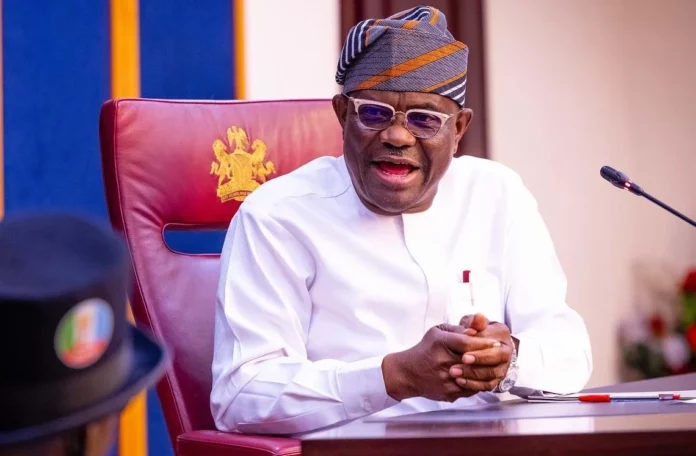In a sharp address on national television, the Minister of the Federal Capital Territory (FCT), Nyesom Wike, dismissed accusations that the current government is engaged in or tolerates the genocide of Christians in Nigeria. He described such claims as “politics taken too far,” and said they were being floated by opposition forces seeking to destabilise the administration of President Bola Tinubu.
Wike emphasised his personal identity as a committed Christian — “my father is a pastor, my family are all Christians” — and pointed out that he serves within the government. He said it would be both insulting to his faith and to his public service to suggest the administration supports such religious persecution.
According to him, the suggestion that Christians are being systematically targeted by the government does not hold up when one considers the religious composition of senior security officers — citing that the Inspector-General of Police, the Director-General of the State Security Service and the Chief of Defence Staff are all Christians. He argued that such facts undermine any credible basis for a claim that “a government … supports genocide against Christians.”
Wike asserted that President Tinubu — whose wife is a pastor — would never allow religious violence to be ignored or covered up. “The President I know cannot shut his eyes to such atrocities,” he said. He further countered suggestions that government inaction equals complicity, stating that the current administration has invested more resources into counter-terrorism than any previous government.
The minister accused opposition parties of using the insecurity situation — including terrorism and banditry — as a tool to stir religious animosity ahead of the 2027 elections. He claimed the narrative is similar to tactics used during the 2015 election cycle against former President Goodluck Jonathan. He said: “This is exactly the same script they used in 2015 against Jonathan. The opposition knows no party is currently strong enough to challenge President Tinubu, so they are desperate to create tension. This genocide claim is just a political weapon.”
Wike stressed that violence from terrorist and bandit groups is not confined to a single religion or region — Christians, Muslims and non-believers have all been victims. He pointed out that some of the worst incidents — such as the kidnapping of schoolgirls in Chibok and the attacks in Benue — occurred before President Tinubu’s administration. He argued it would be unfair and factually incorrect to link those older incidents to the current government as though they were evidence of a policy of targeting Christians.
He appealed to Nigerians and the international community not to accept uncritically reports that may be shaped by internal politics. “I support any country genuinely willing to help Nigeria fight terrorism,” he said. “But no one should use our internal challenges for politics. This government is not helpless; it’s working and will continue to work to solve the problem.”
Nigeria has long grappled with multiple security challenges, including insurgency in the north-east, banditry in the north-west, communal conflicts in the Middle Belt and kidnappings across the country. Claims of religious persecution, particularly towards Christians in some regions, have become part of public debate. At the same time, politics in Nigeria often intersect with religion and ethnicity, and allegations of bias or targeted violence carry strong weight.
In recent years, some Christian-led groups have claimed that the government is failing to protect them, or even facilitating attacks against Christians in certain communities. Those claims frequently demand government action or international attention. On the other hand, critics argue that such narratives may be over-simplified, neglecting the fact that many victims are from different faith groups and that many perpetrators also act along ethnic, criminal or regional lines rather than purely religious ones.
Minister Wike’s remarks reflect a broader government positioning that rejects sectarian framing of violence, arguing instead that the threats Nigeria faces cut across religious, ethnic and regional lines. By emphasising the religious background of senior security officials and the Christian faith of many government actors, Wike sought to challenge the credibility of the “Christian genocide” narrative and to frame it as partisan politics.
Why this matters for Nigerians
- National unity and trust: When allegations of religious genocide circulate, they can deepen fears, divisions and suspicions between religious and ethnic communities. The government’s response can influence whether people feel safe, heard and protected.
- Security policy and accountability: If violence is framed as being targeted at a religious group, the expectation is for the government to take specific protective measures. On the other hand, framing violence as indiscriminate may shift the policy focus toward strengthening institutions and rule of law.
- Political timing: As the next major elections in Nigeria approach, many analysts warn of increased use of ethno-religious rhetoric to score political points or mobilise voters. Wike’s claim that the narrative is being used to stir up tensions ahead of the 2027 polls means the public should scrutinise both the evidence and the motivations behind such claims.
- Media and advocacy efforts: How media houses, civil society and international partners report on violence in Nigeria matters. If reporting emphasises only religious identity without full context, there is a risk of inflaming tensions rather than helping the public understand complex security dynamics.
What to watch
- Independent verification of attacks: Monitoring by independent organisations of violence and victimhood across Christian and Muslim communities will help clarify the extent to which any single group is disproportionately affected.
- Government security spending and outcomes: The level of investment in and results from counter-terrorism, de-radicalisation, community policing and restorative justice will shape perceptions of responsiveness.
- Opposition rhetoric and campaign strategy: As 2027 draws nearer, the way political parties address or exploit religious and security issues will be a key signal of how politics and identity are being used.
- Community-level interventions: Beyond national headlines, local efforts in zones prone to violence (such as the Middle Belt, north-west, north-east) that involve inclusive, multi-faith community engagement may dampen or amplify perception of victimisation.

